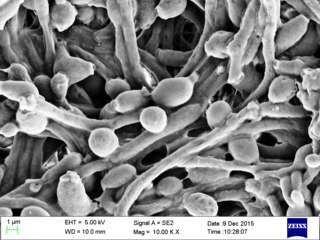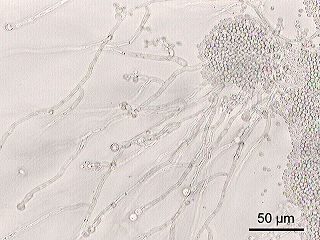
Candidiasis is a fungal infection due to any species of the genus Candida. When it affects the mouth, in some countries it is commonly called thrush. Signs and symptoms include white patches on the tongue or other areas of the mouth and throat. Other symptoms may include soreness and problems swallowing. When it affects the vagina, it may be referred to as a yeast infection or thrush. Signs and symptoms include genital itching, burning, and sometimes a white "cottage cheese-like" discharge from the vagina. Yeast infections of the penis are less common and typically present with an itchy rash. Very rarely, yeast infections may become invasive, spreading to other parts of the body. This may result in fevers, among other symptoms.

Yeasts are eukaryotic, single-celled microorganisms classified as members of the fungus kingdom. The first yeast originated hundreds of millions of years ago, and at least 1,500 species are currently recognized. They are estimated to constitute 1% of all described fungal species.

Candida albicans is an opportunistic pathogenic yeast that is a common member of the human gut flora. It can also survive outside the human body. It is detected in the gastrointestinal tract and mouth in 40–60% of healthy adults. It is usually a commensal organism, but it can become pathogenic in immunocompromised individuals under a variety of conditions. It is one of the few species of the genus Candida that cause the human infection candidiasis, which results from an overgrowth of the fungus. Candidiasis is, for example, often observed in HIV-infected patients. C. albicans is the most common fungal species isolated from biofilms either formed on (permanent) implanted medical devices or on human tissue. C. albicans, C. tropicalis, C. parapsilosis, and C. glabrata are together responsible for 50–90% of all cases of candidiasis in humans. A mortality rate of 40% has been reported for patients with systemic candidiasis due to C. albicans. By one estimate, invasive candidiasis contracted in a hospital causes 2,800 to 11,200 deaths yearly in the US. Nevertheless, these numbers may not truly reflect the true extent of damage this organism causes, given new studies indicating that C. albicans can cross the blood–brain barrier in mice.

Candida is a genus of yeasts. It is the most common cause of fungal infections worldwide and the largest genus of medically important yeasts.

Pichia kudriavzevii is a budding yeast involved in chocolate production. P. kudriavzevii is an emerging fungal nosocomial pathogen primarily found in the immunocompromised and those with hematological malignancies. It has natural resistance to fluconazole, a standard antifungal agent. It is most often found in patients who have had prior fluconazole exposure, sparking debate and conflicting evidence as to whether fluconazole should be used prophylactically. Mortality due to P. kudriavzevii fungemia is much higher than the more common C. albicans. Other Candida species that also fit this profile are C. parapsilosis, C. glabrata, C. tropicalis, C. guillermondii and C. rugosa.

Saccharomycotina is a subdivision (subphylum) of the division (phylum) Ascomycota in the kingdom Fungi. It comprises most of the ascomycete yeasts. The members of Saccharomycotina reproduce by budding and they do not produce ascocarps.
A killer yeast is a yeast, such as Saccharomyces cerevisiae, which is able to secrete one of a number of toxic proteins which are lethal to susceptible cells. These "killer toxins" are polypeptides that kill sensitive cells of the same or related species, often functioning by creating pores in target cell membranes. These yeast cells are immune to the toxic effects of the protein due to an intrinsic immunity. Killer yeast strains can be a problem in commercial processing because they can kill desirable strains. The killer yeast system was first described in 1963. Study of killer toxins helped to better understand the secretion pathway of yeast, which is similar to those of more complex eukaryotes. It also can be used in treatment of some diseases, mainly those caused by fungi.

The University of Tennessee, Knoxville is a public land-grant research university in Knoxville, Tennessee. Founded in 1794, two years before Tennessee became the 16th state, it is the flagship campus of the University of Tennessee system, with ten undergraduate colleges and eleven graduate colleges. It hosts more than 30,000 students from all 50 states and more than 100 foreign countries. It is classified among "R1: Doctoral Universities – Very high research activity".
Jimmy G. Cheek is Chancellor Emeritus and Distinguished Professor Emeritus of Higher Education in Department of Educational Leadership and Policy Studies at The University of Tennessee, Knoxville (UTK) and Former Director of the Postsecondary Education Research Center. He is also Professor Emeritus at the University of Florida. As the state's flagship research campus, UT Knoxville is currently ranked as a Top 50 public institution.

David R. Soll is a professor of Biology at the University of Iowa. He is best known for the motion analysis of living cells, the discovery of Candida albicans phenotypic switching and monoclonal antibody technology.
Mycobiota are a group of all the fungi present in a particular geographic region or habitat type. An analogous term for Mycobiota is funga.
John Joseph Quinn was an American theoretical physicist as well as an academic administrator; he was a former Chancellor and a member of the faculty at The University of Tennessee, Knoxville, US. He was considered to be an expert in the areas of solid-state physics and many-body theory including two dimensional Composite fermions, low-dimensional systems, quantum Hall effect and nanoscience. Quinn was also one of the first researchers to recognize that physics of ‘two-dimensional electronic systems’ needs to be treated as a professional-sub-specialty.

Neil Andrew Robert Gow is a British microbiologist who is a professor of microbiology and deputy vice chancellor at the University of Exeter. Previously he served at the University of Aberdeen for 38 years and retains an honorary chair there.
Beatrice B. "Bebe" Magee is an American biochemist and geneticist with expertise in molecular mycology and fungal genetics. She earned her B. A. in chemistry from Brandeis University in 1962 and her M. A. in biochemistry from the University of California, Berkeley, in 1964. She has been co-author on over 40 publications in peer-reviewed journals and an invited speaker at scientific meetings including Woods Hole and Cold Spring Harbor courses as well as at professional mycology societies.

Kaustuv Sanyal is an Indian molecular biologist, mycologist and a professor at the Molecular Biology and Genetics Unit of the Jawaharlal Nehru Centre for Advanced Scientific Research (JNCASR). He is known for his molecular and genetic studies of pathogenic yeasts such as Candida and Cryptococcus). An alumnus of Bidhan Chandra Krishi Viswavidyalaya and Madurai Kamaraj University from where he earned a BSc in agriculture and MSc in biotechnology respectively, Sanyal did his doctoral studies at Bose Institute to secure a PhD in Yeast genetics. He moved to the University of California, Santa Barbara, USA to work in the laboratory of John Carbon on the discovery of centromeres in Candida albicans. He joined JNCASR in 2005. He is a member of the Faculty of 1000 in the disciplines of Microbial Evolution and Genomics and has delivered invited speeches which include the Gordon Research Conference, EMBO conferences on comparative genomics and kinetochores. The Department of Biotechnology of the Government of India awarded him the National Bioscience Award for Career Development, one of the highest Indian science awards, for his contributions to biosciences, in 2012. He has also been awarded with the prestigious Tata Innovation Fellowship in 2017. The National Academy of Sciences, India elected him as a fellow in 2014. He is also an elected fellow of Indian Academy of Sciences (2017), and the Indian National Science Academy (2018). In 2019, he has been elected to Fellowship in the American Academy of Microbiology (AAM), the honorific leadership group within the American Society for Microbiology. He was awarded the J.C. Bose National Fellowship in 2020.
Lawrence August Taylor was an American geochemist and petrologist working at the Department of Earth and Planetary Sciences in the University of Tennessee. He is the founder of the UT Planetary Geosciences Institute and was also its director until late 2017.
Alexander "Sandy" D. Johnson is an American biochemist and Professor and Vice Chair of the Department of Microbiology and Immunology at the University of California, San Francisco. He is a member of the U.S. National Academy of Sciences.
Carol Kumamoto is an American microbiologist who is Professor of Molecular Biology & Microbiology at Tufts University. She investigates the filamentous growth of Candida albicans, a fungal pathogen that causes several diseases. She is also interested in how C. albicans interacts with its host during colonisation and invasive diseases. She is a Fellow of the American Association for the Advancement of Science and the American Academy of Microbiology.

Munira Adnan Basrai is an American geneticist researching genome stability and cell cycle regulation in yeast and human cancers. She is a senior investigator at the National Cancer Institute.

Anming Hu is a Chinese-Canadian academic who worked as an associate professor in the Department of Mechanical, Aerospace and Biomedical Engineering at the University of Tennessee, Knoxville (UTK) from 2013 to February 2020 when he was charged with fraud, after which UT suspended him.











